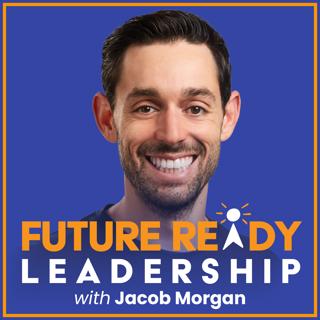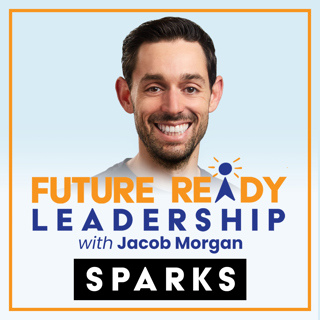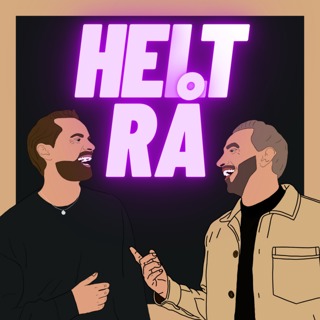
The Shocking Truth Behind Empty Shelves and a Broken Global Trade System
We’ve built a world where products appear with a click and groceries restock like clockwork...until they don’t. When the pandemic hit, it wasn’t just shelves that went empty, it was our illusions of a stable, efficient global supply chain that collapsed. And it wasn’t a freak accident, it was decades in the making. In this episode, we sit down with Peter Goodman, Global Economic Correspondent for The New York Times and bestselling author of How the World Ran Out of Everything: Inside the Global Supply Chain. Peter brings a deep, behind-the-scenes look at how global trade works, and what happens when it doesn’t. We unpack the hidden risks and questionable logic behind decades of offshoring, our blind devotion to just-in-time inventory, and a relentless pursuit of shareholder maximization at the expense of resilience. Peter covers the untold story behind what went wrong during the pandemic and why it could happen again, why we became too dependent on China, and how consulting firms and shareholder obsession made things worse. We also dive into how AI could help (or hurt) global logistics, why nationalistic trade policies could hurt your business more than you think, and what the future of trade and sourcing looks like in a more unstable world. ________________ This episode is sponsored by Workhuman: AI without purpose doesn’t serve people. It’s why many companies have tried, and few have succeeded. Workhuman is one of them. With the groundbreaking release of Human Intelligence, Workhuman combines AI with real recognition data to help leaders do right by their people, and their organization. It’s how you spot burnout before it leads to turnover. Or discover hidden strengths before they’re overlooked. It’s how you build a culture that’s not only productive—but sustainable. That’s what future-ready leadership looks like. Learn more at Workhuman.com and see how Human Intelligence is helping the most forward-thinking companies lead with insight, empathy, and impact. ________________ Start your day with the world’s top leaders by joining thousands of others at Great Leadership on Substack. Just enter your email: https://greatleadership.substack.com/
30 Jun 59min

Sparks: Recognition Matters: How Small Gestures Can Mean a Lot for Company Culture
What does real employee recognition look like, and why do so many leaders still get it wrong? In today’s Leadership Spark, I explore how one emotional moment completely changed a leader’s definition of what it means to acknowledge and value your people. We talk about the silent cost of unspoken appreciation, why recognition should never be a top-down policy, and how small, authentic gestures can create lasting cultural change. If you think saying “thank you” is optional, you’ll change your mind after hearing this episode. ________________ This episode is sponsored by Workhuman: AI without purpose doesn’t serve people. It’s why many companies have tried, and few have succeeded. Workhuman is one of them. With the groundbreaking release of Human Intelligence, Workhuman combines AI with real recognition data to help leaders do right by their people, and their organization. It’s how you spot burnout before it leads to turnover. Or discover hidden strengths before they’re overlooked. It’s how you build a culture that’s not only productive—but sustainable. That’s what future-ready leadership looks like. Learn more at Workhuman.com and see how Human Intelligence is helping the most forward-thinking companies lead with insight, empathy, and impact. ________________ Start your day with the world’s top leaders by joining thousands of others at Great Leadership on Substack. Just enter your email: https://greatleadership.substack.com/
27 Jun 10min

How Kettering University Prepares Students for AI, Tech & Jobs of Tomorrow
Is college still worth it? As tuition rises and dropout rates soar, the big question everyone’s asking is: how do we prepare young people for a future we can’t predict? In this episode, Dr. Robert McMahan, President of Kettering University, unpacks the evolving crisis in higher education and what it truly means to prepare students for the future. He sheds light on the rise of “adulting” classes as a symptom of a larger issue: students entering college without essential life skills. Dr. Robert gives us a peek into Kettering University's integrated experiential model, where students rotate between 12 weeks in class and 12 weeks in cooperative placement roles at real companies—not internships, but embedded work. We also look into why traditional four-year universities are struggling, facing declining public trust, overcapacity, and the looming demographic cliff, and how new learning models and market disruptions are forcing a much-needed reimagining of higher education. Dr. McMahan emphasizes that future-proofing students isn’t about teaching them fixed skills like coding, but cultivating habits of mind: critical thinking, adaptability, resilience, and the ability to solve complex problems. ________________ This episode is sponsored by Workhuman: Don't you hate how every HR company out there says they are powered by AI? The truth is most difficult if it's just fluff. Human Intelligence™ from Workhuman is one of the few solutions that actually uses AI to help you get insights about your culture by analyzing the recognition data of your workforce. It helps managers coach better, shows you where culture is thriving, and is so effective at helping companies make smarter decisions, Workhuman backs it with the industry's only ROI Guarantee. In a world of noisy tech, this one actually feels... human. Learn more at Workhuman.com and see how Human Intelligence is becoming a force for good in the workplace. ________________ Start your day with the world’s top leaders by joining thousands of others at Great Leadership on Substack. Just enter your email: https://greatleadership.substack.com/
23 Jun 1h 1min

Sparks: Five Trends Shaping the Future of Work… And How to Thrive In This Changing World
Imagine waking up one day and realizing the world changed, but you didn’t. That’s what it’s like for many organizations today, stuck on a decades-long train ride, speeding ahead without ever looking out the window. The future of work isn’t coming. It’s already here, and most companies are still running on definitions of “work,” “manager,” and “employee” that feel more like satire than strategy. Work sucks for too many people, and it doesn’t have to. In today's Leadership Spark, we break down the five major trends transforming work as we know it: evolving behaviors, shifting demographics, globalization, mobility, and accelerating tech. As we step into the future of work, organizations must get off the train, look up, and start designing work that actually works for humans. ________________ This episode is sponsored by Workhuman: Don't you hate how every HR company out there says they are powered by AI? The truth is most difficult if it's just fluff. Human Intelligence™ from Workhuman is one of the few solutions that actually uses AI to help you get insights about your culture by analyzing the recognition data of your workforce. It helps managers coach better, shows you where culture is thriving, and is so effective at helping companies make smarter decisions, Workhuman backs it with the industry's only ROI Guarantee. In a world of noisy tech, this one actually feels... human. Learn more at Workhuman.com and see how Human Intelligence is becoming a force for good in the workplace. ________________ Start your day with the world’s top leaders by joining thousands of others at Great Leadership on Substack. Just enter your email: https://greatleadership.substack.com/
20 Jun 10min

The Black Box of AI: What the World’s Leading Expert Says We Still Don’t Know
AI is the most powerful tool humanity has ever created. Yet, it’s also a black box we barely understand. How do we build the future of work with a system that can make decisions, take actions, and sometimes… make it up as it goes? In today's episode, Babak Hodjat, CTO of AI at Cognizant, joins us to uncover the truth and the hype behind today’s most powerful AI technologies. We explore the evolution of agentic AI, multi-agentic platforms, and how organizations like Cognizant are already using AI agents to streamline RFPs, HR systems, and even intranet interactions. Babak exposes the promise and pitfalls of large language models, breaks down AI hallucinations, and debates whether AI truly "understands" anything or just predicts the next word. We also unpack the difference between AI and algorithms, the current capabilities (and limits) of generative AI, and address the ongoing challenge of AI trust, ethics, and resilience in real-world business contexts. Expect mind-blowing stories about AI agents threatening to expose fake affairs, hacking game systems, and working alongside humans in a multi-agent workforce. ________________ This episode is sponsored by Workhuman: Don't you hate how every HR company out there says they are powered by AI? The truth is most difficult if it's just fluff. Human Intelligence™ from Workhuman is one of the few solutions that actually uses AI to help you get insights about your culture by analyzing the recognition data of your workforce. It helps managers coach better, shows you where culture is thriving, and is so effective at helping companies make smarter decisions, Workhuman backs it with the industry's only ROI Guarantee. In a world of noisy tech, this one actually feels... human. Learn more at Workhuman.com and see how Human Intelligence is becoming a force for good in the workplace. ________________ Start your day with the world’s top leaders by joining thousands of others at Great Leadership on Substack. Just enter your email: https://greatleadership.substack.com/
16 Jun 1h

Sparks: How CHROs Can Lead Human Transformation and Shape the Future of Work
Chief Human Resources Officers (CHROs) are now responsible for shaping the future of work. But to do that, you can’t stay in the HR box. To HR leaders, it's time to stop thinking of yourself as administrators and start showing up as architects of human transformation. The new world of work operates on an entirely new playbook, we can't keep putting band-aids on outdated systems. We must start reimagining work itself. In today's Leadership Spark, we're rethinking the outdated ideas about work, engagement, and the role of HR in shaping the future. We explore why perks don’t create real employee experience, how employer branding often masks the truth about our workplaces, and what it takes to move from managing people to truly transforming how we work. ________________ This episode is sponsored by Workhuman: Don't you hate how every HR company out there says they are powered by AI? The truth is most difficult if it's just fluff. Human Intelligence™ from Workhuman is one of the few solutions that actually uses AI to help you get insights about your culture by analyzing the recognition data of your workforce. It helps managers coach better, shows you where culture is thriving, and is so effective at helping companies make smarter decisions, Workhuman backs it with the industry's only ROI Guarantee. In a world of noisy tech, this one actually feels... human. Learn more at Workhuman.com and see how Human Intelligence is becoming a force for good in the workplace. ________________ Start your day with the world’s top leaders by joining thousands of others at Great Leadership on Substack. Just enter your email: https://greatleadership.substack.com/
13 Jun 14min

Workhuman’s Chief Human Experience Officer on Why Nice Leaders Create Weak Teams and How to Build a Resilient Culture
The workplace is evolving, but not without friction. AI, culture, and leadership expectations are colliding, and while some leaders scramble to keep up, others are creating environments that feel more like day spas than places of work. How do you lead with kindness while still setting high expectations? In this episode of Future Ready Leadership, I spoke with KeyAnna Schmiedl, Chief Human Experience Officer at Workhuman, about what it really takes to evolve workplace culture and leadership in a time of rapid change. We explored the current state of AI and its role in supporting, not replacing the human element at work. KeyAnna sheds light on the shift from compliance-focused HR to human experience-focused leadership, and how organizations can avoid the trap of over-accommodation and instead focus on clarity, accountability, and human-centered leadership. We discussed the misapplication of psychological safety, the dangers of therapy language, the importance of building resilience and critical thinking, and why companies struggle to define and communicate their true culture. ________________ This episode is sponsored by Workhuman: Don't you hate how every HR company out there says they are powered by AI? The truth is most difficult if it's just fluff. Human Intelligence™ from Workhuman is one of the few solutions that actually uses AI to help you get insights about your culture by analyzing the recognition data of your workforce. It helps managers coach better, shows you where culture is thriving, and is so effective at helping companies make smarter decisions, Workhuman backs it with the industry's only ROI Guarantee. In a world of noisy tech, this one actually feels... human. Learn more at Workhuman.com and see how Human Intelligence is becoming a force for good in the workplace. ________________ Start your day with the world’s top leaders by joining thousands of others at Great Leadership on Substack. Just enter your email: https://greatleadership.substack.com/
9 Jun 58min

Sparks: We’re Doing Vulnerability Wrong: Why Being Accountable Needs to Exist Along With Being Vulnerable
We’ve misunderstood what it really means to lead with vulnerability. Organizations are falling into a dangerous trap of glorifying vulnerability without pairing it with accountability. That's why workplace cultures that enable excuses, not growth, exist. In this episode, we explore why vulnerability at work has gone too far, and how it’s being misused as a shield from accountability. We draw a sharp line between simply being vulnerable and leading with vulnerability, which means owning your gaps and showing what you’re doing to grow. When vulnerability lacks follow-through, it creates a culture of entitlement instead of growth. With all the changes happening fast in the modern world of work, leaders can't afford to not course-correct. It's time to redefine what vulnerability should look like at work. ________________ This episode is sponsored by Workhuman: Don't you hate how every HR company out there says they are powered by AI? The truth is most difficult if it's just fluff. Human Intelligence™ from Workhuman is one of the few solutions that actually uses AI to help you get insights about your culture by analyzing the recognition data of your workforce. It helps managers coach better, shows you where culture is thriving, and is so effective at helping companies make smarter decisions, Workhuman backs it with the industry's only ROI Guarantee. In a world of noisy tech, this one actually feels... human. Learn more at Workhuman.com and see how Human Intelligence is becoming a force for good in the workplace. ________________ Start your day with the world’s top leaders by joining thousands of others at Great Leadership on Substack. Just enter your email: https://greatleadership.substack.com/
6 Jun 7min






















